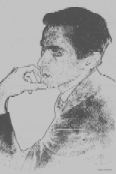|
A MEMORIAL TRIBUTE was held May 6th for
the late William Gaddis, the esteemed novelist who died last
December. The course of my life was irrevocably changed by my
discovery of his work in 1975, and after nearly 25 years of writing
and thinking about his titanic novels, I felt compelled to attend
this tribute to the man who, I am now convinced, is the greatest
American novelist of the twentieth century.
The tribute was held in the august
auditorium of the American Academy of Arts and Letters in New York
City, into which Gaddis was inducted in 1984. As it happens, the
last time I had seen Gaddis was in the same building five years
earlier, an awards ceremony where Gaddis and the other members of
the Academy sat on the stage (like the faculty at a graduation),
facing us like totems guarding the gates of American literature.
Gracing the stage this time was a smaller
but well-chosen group: Sarah Gaddis, his daughter, began the event
on an elegiac note, almost breaking down in tears as she confessed
how difficult it was to adjust to the absence created by her
father's death. (She once wrote an autobiographical novel, Swallow
Hard, largely about her relationship to him.) She was followed
by gentleman-novelist Louis Auchincloss, who gave an overview of
Gaddis's achievement (in a sumptuous Anglo-American accent) and paid
tribute to his vast erudition. Auchincloss is known for his legal
novels, but he admitted Gaddis's knowledge of the law far exceeded
his.
William H. Gass followed with a brilliant
and witty account of the impact The Recognitions had on his
generation of writers. Gass's life intersected with Gaddis's on many
occasions, most recently in Germany, where Gass accompanied Gaddis
to a book event in Cologne where he was treated like a movie star:
stepping out of a black limo, Gaddis was surrounded by photographers
popping flashes as if he were attending the premiere of his latest
movie — a conceit helped along by the fact that Gaddis had
movie-star good looks, resembling Leslie Howard when younger, and
William Holden in later life.
Short-story writer Joy Williams was next,
first reading a hilarious passage from A Frolic of His Own,
then recounting her memories of the man she always called Mister
Gaddis, despite their friendship. (I know the feeling: I met Gaddis
several times, was even a guest at his house for three days, but
considered it unthinkable to address him as anything but Mr.
Gaddis.) Painter Julian Schnabel followed, with a somewhat
difficult-to-follow account of how Gaddis's view of painting (in The
Recognitions) influenced his own development as an artist.
The
last guest to speak was filmmaker D. A. Pennebaker (best known for
his Bob Dylan documentary, Don't Look Back), who entertained
us with some anecdotes about Gaddis in the 1940s.
Gaddis's son Matthew — the spitting image
of his father — then introduced a brief slide-show presentation,
ranging from Gaddis as an 8-year-old Eagle Scout and a shot of him
as a young man in an improbable cowboy hat holding the reins of a
horse — a Harvard version of the Marlboro man —t o photos taken
later in life.
The audience was rather small — somewhere
between 100-150 people — but made up in quality what it may have
lacked in quantity. Among the many writers there were Don DeLillo,
E. L. Doctorow, Joseph McElroy, David Markson, Harry Mathews, Ann
Beattie, Walter Abish, Bradford Morrow, and Mary Caponegro. Many of
us who have written about Gaddis were there — Gregory Comnes,
Frederick R. Karl, Joseph Tabbi, Christopher Knight — as were two of
Gaddis's three wives. At least one of his former publishers was
there (Aaron Asher) along with some of his current German ones, and
a good many family friends. (There were probably other distinguished
guests whom your reporter didn't recognize.) The only disappointment
was the lack of any information on future publications: Gaddis left
behind a final novel, Agape Agape, but its publication date
remains up in the air. Matthew avoided questions on this topic with
lawyerly aplomb. (However, one of Gaddis's German publishers told me
they had already arranged to publish a collection of his essays,
along with Torschlusspanik, a radio play he wrote for
Deutschland Radio last year, which may be the opening chapter of Agapé
Agape.)
There were some felicitous coincidences
that illustrated Gaddis's belief in “the unswerving punctuality of
chance” (a phrase that appears in all four of his novels). Looking
for a restaurant after the event, Markson, Tabbi, Caponegro, and I
were wandering around the West Village when we stumbled upon Horatio
Street, Wyatt's address in The Recognitions. And during my
taxi ride to the airport the following day, I passed the brownstone
on 96th street where so much of J R is set. Best of all was
my in-flight reading choice: James Hilton's old classic Lost
Horizon, which turned out to be the source of a literary
allusion in Carpenter's Gothic that had always eluded me.
In
that shortest, shapeliest of his novels, Gaddis quoted Hilton's
description of a character who, despite his setbacks, had “a sense
in which he felt that he was still a part of all that he might have
been.” This striving to achieve one's full potential bedevils many
of Gaddis's characters — most of them failures to some degree — but
this memorial tribute was a rousing affirmation that Gaddis became
everything a great novelist could, and should, be.
LaGuardia Airport
7 May 1999
Tributes to William Gaddis by Sarah
Gaddis, William H. Gass, Julian Schnabel, D.A. Pennebaker, and Joy
Williams all appear in the print version of Conjunctions:33,
Crossing Over.
from
http://www.conjunctions.com/webcon/moore.htm
|
|

